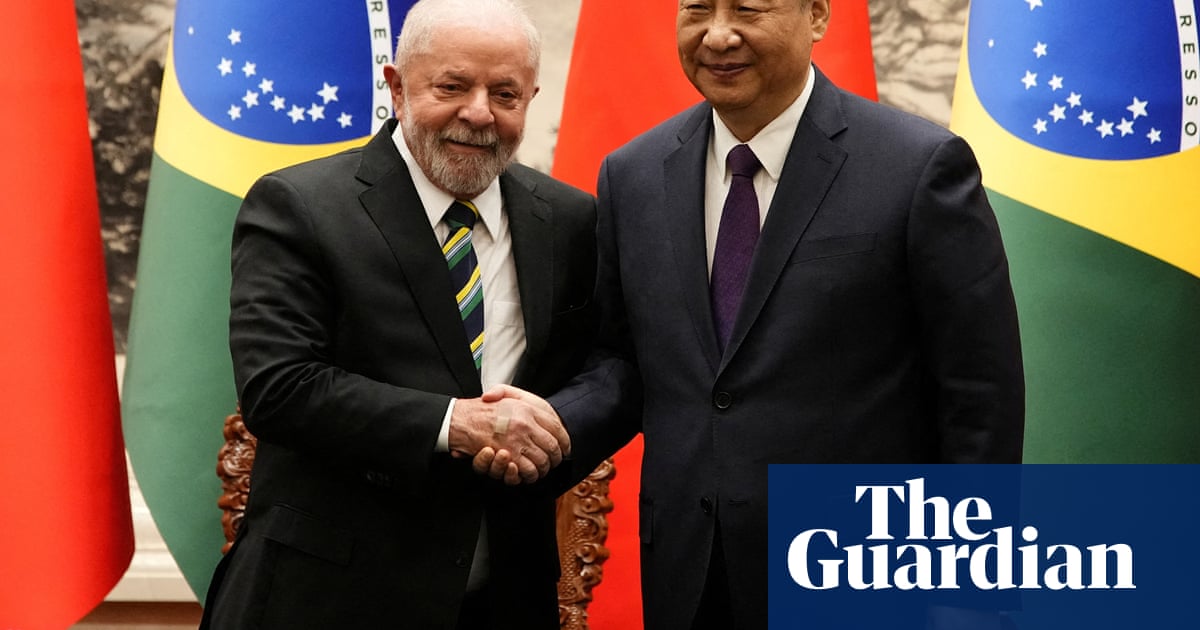The Brazilian president,Luiz Inácio Lula da Silva, has heralded his desire to build “indestructible” relations withChina, as the leaders of three of Latin America’s biggest economies flew to Beijing against the backdrop ofDonald Trump’s trade war and the profound international uncertainty his presidency has generated.
Lula touched down in China’s capital on Sunday for a four-day state visit, accompanied by 11 ministers, top politicians and a delegation of more than 150 business leaders.
Hours later Colombia’s president, Gustavo Petro, arrived, making a beeline for the Great Wall of China and declaring his desire for the South American country to not “only look one way” towards the US. “We have decided to take a profound step forward between China and Latin America,” Petro said.
Chile’s Gabriel Boric has also travelled to Beijing to attend Tuesday’s meeting between members of the Community of Latin American and Caribbean States (Celac) and Chinese representatives.
Addressing hundreds of Chinese and Brazilian business chiefs in the Chinese capital on Monday, Lula hit out atTrump’s tariffs, saying he could not accept the measures “that the president of the US tried to impose on planet Earth, from one day to the next”.
The Brazilian leftist said he hoped to build an “indispensable” relationship with China – already Brazil’s top trading partner – and heaped praise on his Communist party hosts as his officials announced $4.6bn (£3.5bn) of Chinese investment in their country. On Tuesday, Lula is scheduled to meet China’s leader,Xi Jinping, who is expected to return the visit in July, when Xi travels to the Brics summit in Rio.
“China has often been treated as though it were an enemy of global trade when actually China is behaving like an example of a country that is trying to do business with countries which, over the past 30 years, were forgotten by many other countries,” said Lula, who is expected to seek major Chinese investments in Brazilian infrastructure projects.
The visit of the three South American leaders to China underlines the east Asian country’s rapidly growing footprint in a region where, over the past 25 years, it has become a voracious consumer of commodities such as soybeans, iron ore and copper. Chinese companies have also poured into the region. Electric cars made by the Chinese manufacturer BYD can be seen cruising the streets of Brazilian cities, from Brasília to Boa Vista, deep in the Amazon.
The visits also come amid global jitters over Trump’s volatile presidency and Latin American anxiety and suspicion over the US president’s plans for a region where he hasthreatened to “take back” the Panama canal– by force if necessary.
Matias Spektor, an international relations professor at the Getúlio Vargas Foundation, a Brazilian thinktank and university, said the presence of the three South American presidents in Beijing underscored how, in the Trump era, with the US in retreat, such leaders were increasingly reaching out to other parts of the world.
“It tells us that countries around the world are willing to go out … to exploit all the opportunities that are there in the international system – and there are many. Because, as America turns away from free trade and as America adopts a policy that is … instead of transactional, predatory – countries have an incentive to engage with those who are transactional,” Spektor said, pointing to recent trips Lula made to Japan and Vietnam.
“[Lula] is very proactively trying to open trade for Brazil at a time when America is undoing the previous rules of the game, and the new rules of the game are not yet born … These [Latin American] countries want to shape the norms that are likely to emerge now. And those rules are not going to emerge in Washington DC. They are going to be made globally,” Spektor added.
Spektor said Latin American leaders such as Lula had long considered the world a multipolar place. “What happened on 20 January [with Trump’s return to power] is that the barrage of policy change coming from Washington DC has accelerated the belief that was already in place that the axis of global power has for a while been moving towards the east, and somewhat towards the south.”
